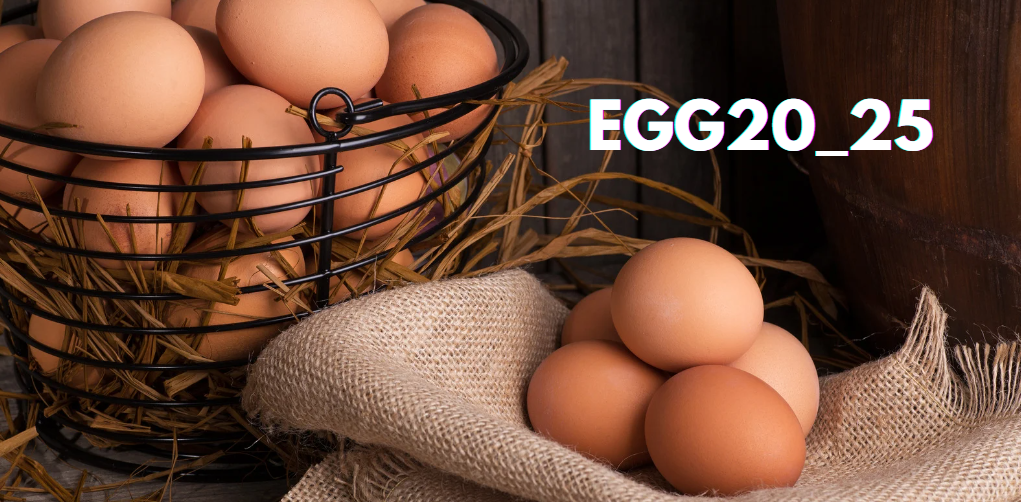Contents
Introduction
In the rapidly advancing field of biotechnology, Egg20_25 represents a significant leap forward in enhancing egg production efficiency and quality. Developed through pioneering research, this innovative biotechnological advancement promises to transform the poultry industry, offering a range of benefits from improved production rates to superior egg quality.
This comprehensive article delves into the intricacies of Egg20_25, providing in-depth analyses, unique insights, and expert interpretations to shed light on its impact and future potential.
Understanding Egg20_25: An Overview
What is Egg20_25?
Egg20_25 is a biotechnological advancement developed to optimize various aspects of egg production. This breakthrough technology is rooted in cutting-edge research and represents a significant improvement over traditional methods. By enhancing the biological processes involved in egg production, Egg20_25 aims to boost efficiency, increase egg quality, and contribute to sustainable poultry farming practices.
The Development of Egg20_25
The development of Egg20_25 involved extensive research and innovation in the field of biotechnology. Researchers focused on understanding and manipulating the genetic and physiological factors that influence egg production. This process led to the creation of Egg20_25, which integrates advanced techniques to address key challenges in poultry farming.
Key Features of Egg20_25
Enhanced Egg Production Efficiency
One of the primary goals of Egg20_25 is to enhance the efficiency of egg production. By optimizing the biological processes involved, Egg20_25 helps increase the number of eggs produced per hen, thereby improving overall productivity. This advancement is particularly beneficial for commercial poultry farms seeking to maximize output while maintaining quality.
Improved Egg Quality
In addition to boosting production efficiency, Egg20_25 focuses on improving the quality of eggs. This includes enhancing factors such as shell strength, yolk color, and nutritional content. The improved quality of eggs produced with Egg20_25 can lead to higher market value and better consumer satisfaction.
Sustainability and Environmental Impact
Egg20_25 also emphasizes sustainability in poultry farming. By increasing efficiency and quality, this technology helps reduce waste and resource consumption. This aligns with broader environmental goals and supports the development of more sustainable farming practices.
The Science Behind Egg20_25
Genetic and Physiological Innovations
The core of Egg20_25 lies in its genetic and physiological innovations. Researchers have identified and targeted specific genes and pathways that influence egg production. By manipulating these factors, Egg20_25 enhances the biological processes involved in egg formation.
Biotechnological Techniques
Egg20_25 employs a range of biotechnological techniques to achieve its goals. These include advanced genetic engineering, gene editing, and hormone regulation. The integration of these techniques allows for precise control over the factors affecting egg production.
Research and Development
The development of Egg20_25 involved extensive research and testing. Scientists conducted numerous studies to evaluate the effectiveness of the technology and ensure its safety. The rigorous research process has contributed to the reliability and success of Egg20_25 in improving egg production.
Benefits of Egg20_25 for Poultry Farmers
Increased Productivity
For poultry farmers, Egg20_25 offers the potential for significantly increased productivity. By enhancing egg production efficiency, farmers can achieve higher output without the need for additional resources. This translates into improved profitability and a more competitive edge in the market.
Better Egg Quality
The improved egg quality associated with Egg20_25 can lead to enhanced consumer satisfaction and higher market prices. Eggs produced with Egg20_25 are expected to exhibit superior characteristics, such as stronger shells and better nutritional content, making them more desirable to consumers.
Cost Savings
Egg20_25 can also lead to cost savings for poultry farmers. The increased efficiency and quality of egg production reduce the need for additional resources and minimize waste. This results in lower operational costs and increased overall efficiency.
Environmental Benefits
The sustainability aspect of Egg20_25 contributes to reduced environmental impact. By optimizing production processes and minimizing waste, this technology supports environmentally friendly farming practices. This aligns with the growing emphasis on sustainability in the agricultural industry.
Case Studies and Real-World Applications
Commercial Success Stories
Several commercial poultry farms have successfully implemented Egg20_25, resulting in impressive outcomes. These case studies highlight the technology’s effectiveness in improving productivity and quality. Farmers have reported higher egg production rates and better-quality eggs, demonstrating the tangible benefits of Egg20_25.
Comparative Analysis with Traditional Methods
Comparing Egg20_25 with traditional egg production methods reveals its advantages. Traditional methods often involve higher resource consumption and lower efficiency. In contrast, Egg20_25’s advanced approach provides a more sustainable and effective solution for modern poultry farming.
Challenges and Considerations
Technological Adoption
While Egg20_25 offers numerous benefits, its adoption may present challenges. Farmers may need to invest in new equipment or undergo training to effectively implement the technology. Addressing these challenges is crucial for maximizing the potential of Egg20_25.
Regulatory and Ethical Issues
The introduction of advanced biotechnological solutions like Egg20_25 raises regulatory and ethical considerations. Ensuring compliance with regulations and addressing ethical concerns related to genetic manipulation are important aspects of the technology’s implementation.
Long-Term Impact
The long-term impact of Egg20_25 on the poultry industry and the environment will require ongoing evaluation. Continuous monitoring and assessment are necessary to ensure that the technology delivers on its promises and contributes positively to sustainable farming practices.
The Future of Egg Production with Egg20_25
Technological Advancements
The future of egg production is likely to see further advancements in biotechnology. Egg20_25 represents a significant step forward, but ongoing research and development will continue to drive innovation. Future technologies may build on the foundations of Egg20_25 to achieve even greater efficiency and quality improvements.
Integration with Other Innovations
Egg20_25 may be integrated with other technological innovations in agriculture. For example, advancements in artificial intelligence, data analytics, and precision farming could complement Egg20_25, further enhancing its effectiveness and impact.
Global Impact
As Egg20_25 gains traction, its global impact will become more pronounced. The technology’s benefits can extend to poultry farms around the world, contributing to improved food security and sustainability on a global scale.
FAQs
What is Egg20_25?
Egg20_25 is a biotechnological advancement designed to enhance egg production efficiency and quality. It incorporates cutting-edge genetic and physiological innovations to improve various aspects of egg production.
How does Egg20_25 improve egg production efficiency?
Egg20_25 enhances egg production efficiency by optimizing the biological processes involved in egg formation. This leads to an increase in the number of eggs produced per hen and improved overall productivity.
What benefits does Egg20_25 offer to poultry farmers?
Egg20_25 offers several benefits to poultry farmers, including increased productivity, better egg quality, cost savings, and environmental benefits. It helps farmers achieve higher output with reduced resource consumption.
Are there any challenges associated with implementing Egg20_25?
Challenges associated with implementing Egg20_25 may include the need for new equipment, training, and addressing regulatory and ethical considerations. Ensuring effective adoption and compliance is crucial for maximizing the technology’s benefits.
What is the future outlook for Egg20_25?
The future outlook for Egg20_25 includes continued technological advancements, integration with other innovations, and a global impact on poultry farming. Ongoing research and development will drive further improvements and expand the technology’s reach.
Conclusion
Egg20_25 represents a groundbreaking advancement in the field of biotechnology, offering transformative benefits for egg production. By enhancing efficiency, improving quality, and promoting sustainability, Egg20_25 addresses key challenges in poultry farming and sets the stage for future innovations.
This comprehensive analysis highlights the technology’s significance and potential, providing valuable insights for stakeholders in the poultry industry and beyond.







